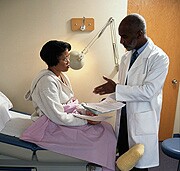For average-risk women, screening should start at age 21 years, be performed every three years
FRIDAY, May 1, 2015 (HealthDay News) — The indications for cervical cancer screening in asymptomatic average-risk women are described in a best practice advice article published online April 30 in the Annals of Internal Medicine.
George F. Sawaya, M.D., from the University of California in San Francisco, and colleagues describe the indications for cervical cancer screening in asymptomatic, average-risk women, aged 21 years or older.
The authors developed seven best practice guidelines. Clinicians should not screen average-risk women younger than 21 years. Screening should start at age 21 years, and be conducted every three years with cytology; average-risk women should not be screened with cytology more often than once every three years. In average-risk women aged 30 years or older, clinicians may use a combination of cytology and human papillomavirus (HPV) testing once every five years. HPV testing should not be performed in women younger than 30 years. Women older than 65 years with three consecutive negative cytology results or two consecutive cytology results plus HPV test results should stop being screened. Average-risk women of any age should not be screened if they have had a hysterectomy with removal of the cervix.
“Historically, physicians have low adherence to cervical cancer screening recommendations, beginning screening too early, performing screening too often, and continuing to screen women at low risk, either by age criteria or after hysterectomy with removal of cervix,” David Fleming, M.D., president of the American College of Physicians, said in a statement.
Full Text
Copyright © 2015 HealthDay. All rights reserved.








